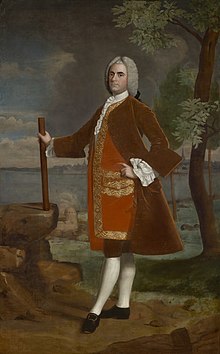Hannah Waldo, Patent Heiress
Hannah Waldo was born in Boston on 21 Nov 1726 and baptized in the town’s First Meetinghouse. She was the daughter of Lucy and Samuel Waldo (shown here).
Samuel Waldo was a merchant who went into land speculation in a big way. In 1729, when Hannah was two years old, he acquired the controlling interest in a big land grant in Maine.
That royal grant had changed hands for many decades because simply having permission from London to claim land didn’t mean a person could actually exercise any control over it.
Waldo also bought a big land grant in Nova Scotia, but that claim was on shaky legal grounds. He spent a fair amount of the 1730s in London, arguing unsuccessfully for that patent and recruiting people to settle on his Maine (main?) claim.
One obstacle to British settlements on what became known as the Waldo Patent was danger from the French and the Native nations allied with them, or just uninterested in losing their territory. Starting in 1740, Waldo promoted a plan to attack the French fortification at Louisbourg to remove that threat.
When Britain finally went to war against France, Gov. William Shirley authorized that military expedition. William Pepperrell was the commander-in-chief, and Samuel Waldo, who had served under Pepperrell in the top ranks of Maine’s militia, was commissioned a brigadier general, second in command of the land forces.
As I discussed yesterday, that expedition was a big success. By the end of 1745, Massachusetts’s military captured the French outpost for the British Empire (though the British Empire decided to give it back in exchange for Madras). Pepperrell was made a baronet. Waldo was addressed as “general” for the rest of his life, and he could step up his efforts to recruit settlers for his land.
Among the people who came to the Waldo Patent in the next few years, before another war broke out, were Georg Frederich Seiter and Christine Salome Hartwick. They would marry and have children, including Christopher Seider. But that’s getting away from Hannah Waldo’s story.
The Waldo and Pepperell families were well acquainted. The general’s son Samuel, Jr., was in the same class at Harvard College as the baronet’s son, Andrew. Furthermore, in 1742 the baronet’s daughter, Elizabeth, had married Nathaniel Sparhawk, a son of Hannah and Samuel, Jr.’s step-grandmother through a second marriage.
In 1746, Hannah Waldo and Andrew Pepperrell became engaged. Andrew was seen as quite a catch. Writing ninety years later, Usher Parsons said: “his comely person and polished manners were a passport to the best circles; and his heirship to a fortune and a baronetcy placed him in the highest social position.”
Sir William and Gen. Waldo were both pleased with this engagement, which would bring together the district’s two leading families (with the Sparhawks tied in as a bonus). The actual wedding date was to be named later when Andrew finished building his house.
And that proved to be a problem.
TOMORROW: Waiting for a wedding.
Samuel Waldo was a merchant who went into land speculation in a big way. In 1729, when Hannah was two years old, he acquired the controlling interest in a big land grant in Maine.
That royal grant had changed hands for many decades because simply having permission from London to claim land didn’t mean a person could actually exercise any control over it.
Waldo also bought a big land grant in Nova Scotia, but that claim was on shaky legal grounds. He spent a fair amount of the 1730s in London, arguing unsuccessfully for that patent and recruiting people to settle on his Maine (main?) claim.
One obstacle to British settlements on what became known as the Waldo Patent was danger from the French and the Native nations allied with them, or just uninterested in losing their territory. Starting in 1740, Waldo promoted a plan to attack the French fortification at Louisbourg to remove that threat.
When Britain finally went to war against France, Gov. William Shirley authorized that military expedition. William Pepperrell was the commander-in-chief, and Samuel Waldo, who had served under Pepperrell in the top ranks of Maine’s militia, was commissioned a brigadier general, second in command of the land forces.
As I discussed yesterday, that expedition was a big success. By the end of 1745, Massachusetts’s military captured the French outpost for the British Empire (though the British Empire decided to give it back in exchange for Madras). Pepperrell was made a baronet. Waldo was addressed as “general” for the rest of his life, and he could step up his efforts to recruit settlers for his land.
Among the people who came to the Waldo Patent in the next few years, before another war broke out, were Georg Frederich Seiter and Christine Salome Hartwick. They would marry and have children, including Christopher Seider. But that’s getting away from Hannah Waldo’s story.
The Waldo and Pepperell families were well acquainted. The general’s son Samuel, Jr., was in the same class at Harvard College as the baronet’s son, Andrew. Furthermore, in 1742 the baronet’s daughter, Elizabeth, had married Nathaniel Sparhawk, a son of Hannah and Samuel, Jr.’s step-grandmother through a second marriage.
In 1746, Hannah Waldo and Andrew Pepperrell became engaged. Andrew was seen as quite a catch. Writing ninety years later, Usher Parsons said: “his comely person and polished manners were a passport to the best circles; and his heirship to a fortune and a baronetcy placed him in the highest social position.”
Sir William and Gen. Waldo were both pleased with this engagement, which would bring together the district’s two leading families (with the Sparhawks tied in as a bonus). The actual wedding date was to be named later when Andrew finished building his house.
And that proved to be a problem.
TOMORROW: Waiting for a wedding.


No comments:
Post a Comment